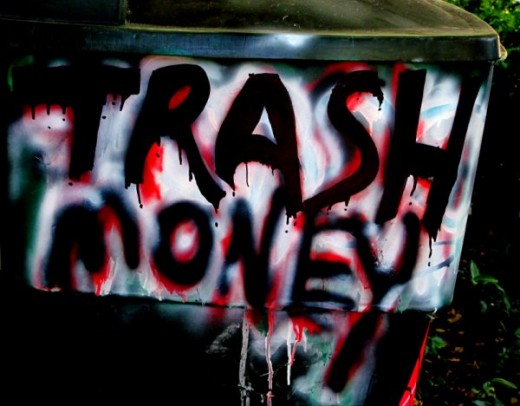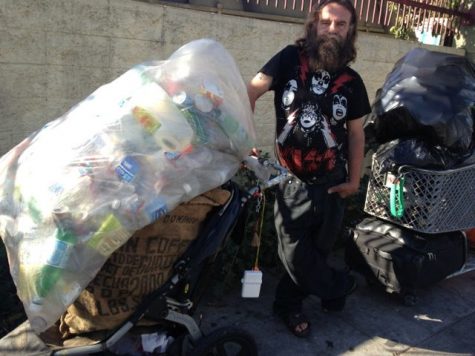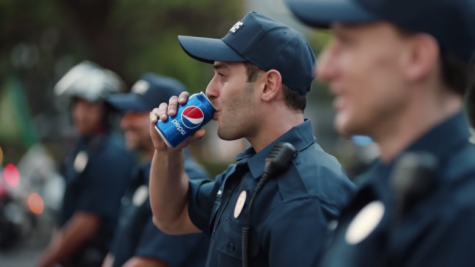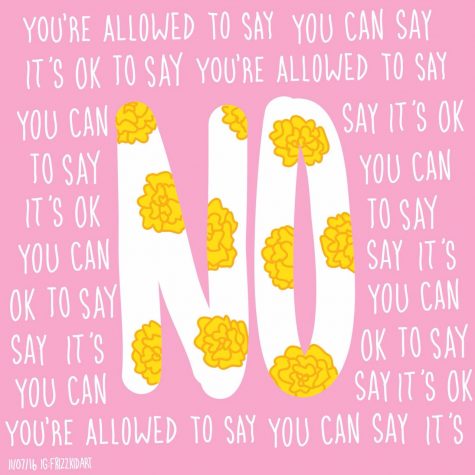One Man’s Can Is Another Man’s Come Up

Recently, I spent some time traveling between Los Angeles and San Francisco, California, hitting cities in between.
I was present for a period of time on USC’s Greek Row, a frat house that was appropriately decorated with beer cans and couches, that sported a “f-ck Trump” sign. It had been spray painted on a wooden slab, and other instances of savagery.
Upon playing a new game that was identified as “beer die,” I noticed a petite lady dressed in scarves and dirty clothing walk into the yard and start picking up the blue and red cans. I wondered, ‘Who is this lady and what am I witnessing?’
When I explain to you what I saw, I call it a demonstration of a symbiotic relationship in society.
These homeless men and women of LA will clean the post party lawns of college student residences, and even ask if they have more bottles or cans inside. With these cans, they will be lucky to make a few dollars off of five, or ten cent bottle and can deposits.
It’s an interesting system that results in a win-win for both parties. Lazy college students can feel better about helping the community and environment, providing a mini job for the needy, giving the homeless or less fortunate an opportunity to make a living collecting cans. This system is wholly supported by community recycling centers.
According to CalRecycle, containers that are eligible to be recycled for cash can be worth five to ten cents. They must say a certain phrase to have value; CA Cash Refund, CA CRV, California Redemption Value etc.
I spent a weekend at the Virginia college UVA, for a back to school social event called Midsummer’s. When I left Charlottesville that Sunday, I noticed the large amount of cans that rolled in the street and broken red solo cups that created a sort of melody and symbolized the only movement in the empty streets, whilst all the students recovered in their beds with gatorade and Advil.
In hindsight, if they had the homeless population, maybe the litter wouldn’t have such a prominent impact on the environment. The top three cities with the highest homeless population are New York, Los Angeles, and Seattle which may explain a lot.
 According to Priceonomics, those that approach collecting cans as a full time job can earn between $30 and $50 a day, in three to five trash bags filled with an estimated 700 bottles and cans.
According to Priceonomics, those that approach collecting cans as a full time job can earn between $30 and $50 a day, in three to five trash bags filled with an estimated 700 bottles and cans.
Where does this money come from, you may ask yourself.
Well, the sum is added to the price of the beverage when you buy it, you pay for the bottle or can deposit. In California, there are over 2,000 recycling centers close to work and residential locations for easy access.
There are many characteristics that can pose a threat to those that collect cans and bottles as a sort of job. Walking with shopping carts can attract negative attention from police, since it’s illegal to steal them from grocery stores. Not all can collectors use them, but the shopping cart provides as a vehicle to transport their daily income.
In cities like San Francisco, the famous Full House hills can cause difficulty to the collectors as well. I’m sure if one is well traveled and has been to New York City, this can be a common sight.
Also, areas which are home to these recycling centers receive a lot of backlash about the clientele that comes rolling through and the people that hang around the area.
Some people even feel threatened by those that collect, because they can be found digging through private residences or someone else’s property for their recyclables. However, some people and the students I met, didn’t seem to mind.
Its interesting, I thought, should they give them holiday cards like you would the mail delivery person or the trash collectors?
This is major in California cities, due to the Bottle Bill. So much that when people are relaxing in public parks, like Dolores, they need not worry about a trash can. Leave your bottles and cans in the open, and a smart scavenger will come get it for you, and make money off of your empties.
In my experience I didn’t profit significantly enough, to continue working hard and returning my cans and bottles, however, I understand the importance of it.
This recycling ecosystem is a success in many ways, backed by legislation. It empowers individuals and organizations to lead the way on environmental issues like such. The hosts of recycling centers are passionate about recycling and provide good value to the cities that they’re in.
This model is perfect for cities that hold college students which generate a lot of recyclables and cities that have a high homeless population or a larger lower class.

Abigail may be a Public Accounting major at Mercy College but she's not your average accountant. Abigail enjoys meditating, journaling and reading in her...







